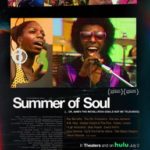For 50 years, footage of Malahia Jackson and Mavis Staples singing “Take My Hand, Precious Lord” into a single mic sat unseen in a basement.
No more.
It’s just one of a staggering number of monumental performances – “the time of my life,” Staples calls it – in Summer of Soul ( … or, when the revolution could not be televised) the directorial debut from Questlove that chronicles the long-forgotten Harlem Cultural Festival that took place over six weekends in the summer of 1969.
Known colloquially as the Black Woodstock, the festival was professionally recorded. But the 40 hours of footage sat unused and unknown for a half-century until Questlove got his hands on it.
Musa Jackson, who attended the festival as a child, but like the rest of America never saw these recordings, serves as a collective consciousness as cutaways of him watching the raw footage appear throughout and alongside other fresh interviews with attendees and performers.
“I’m not crazy,” he says though tears toward the end of the film, as if he’d always doubted whether his memories of crushing on the 5th Dimension’s Marilyn McCoo and seeing a sea of black faces in Mt. Harris Park were real.
Quest wraps the performances around the society of the time as the black community struggled with poverty, joblessness, institutional racism and the assassinations of the Kennedys, Malcolm X and the Rev. Martin Luther King Jr. As one observer puts it, the festival was New York’s attempt “to keep black folks from burning up the city in ’69.”
The performers burned up the stage, however. Here’s Stevie Wonder playing a drum solo. There’s Nina Simone demanding “Are you ready, black people?” And here comes Gladys Knight & the Pips with “I Heard it Through the Grapevine.”
“It wasn’t just about the music,” Knight says in a contemporary interview. “We wanted progress. … We want our people lifting us up.”
B.B. King. The Chambers Brothers. The Staple Singers. Herbie Mann. Max Roach. Hugh Masekela. Sly & the Family Stone. They – and a slew of others – are all there in clips ranging from mere snippets (King) to significant chunks of multiple songs (the Family Stone).
And this is where “Summer of Soul” both triumphs and stumbles slightly. As a documentarian, Questlove did an exceptional job of weaving the societal into the musical to paint a complete picture of Harlem in 1969.



No Comments comments associated with this post